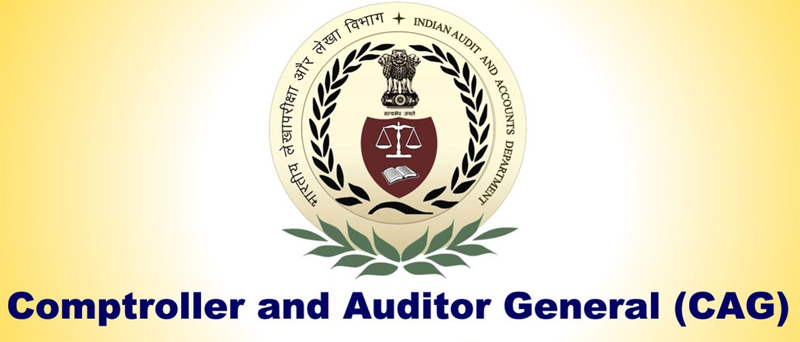Comptroller and Auditor General of India (GS Paper 2, Polity)

Introduction:
- K Sanjay Murthy has been appointed as the new Comptroller and Auditor General (CAG) of India, taking over from Girish Chandra Murmu.
- The CAG plays a vital role in maintaining financial integrity and accountability in India, acting as a guardian of public finances and a critical mechanism in India’s democratic system.
Overview of the CAG's Role and Responsibilities:
- The CAG is the head of the Indian Audit and Accounts Department (IAAD) and is responsible for overseeing public expenditure at both the central and state levels.
- According to Article 148 of the Constitution of India, the CAG is tasked with safeguarding the financial interests of the nation and ensuring that government spending is done within the legal framework.
- In terms of governance, the CAG is recognized as one of the key constitutional bodies, along with the Supreme Court, Election Commission, and Union Public Service Commission.
- The CAG holds significant powers and duties, ensuring transparency and accountability in public financial management.
Appointment and Tenure:
- The CAG is appointed by the President of India, and the appointment is governed by the provisions laid out in the Constitution.
- The incumbent serves a tenure of six years or until they reach the age of 65, whichever is earlier.
- The CAG must take an oath to uphold the Constitution and perform duties impartially.
- The removal process of the CAG is similar to that of a Supreme Court judge and requires a special majority resolution in Parliament for proven misbehavior or incapacity.
Duties and Powers:
The CAG’s primary function is to audit the accounts of the central and state governments, including the Consolidated Fund of India and state funds. The CAG is also responsible for auditing the accounts of government corporations and public sector undertakings that are substantially funded by the government.
Key duties of the CAG include:
- Auditing the tax proceeds and certifying them.
- Examining government expenditure to ensure that funds are spent according to legal and regulatory requirements.
- Submitting annual audit reports to the President, which are then laid before Parliament for further review and scrutiny.
In addition to these legal audits, the CAG also performs propriety audits, where it assesses whether government expenditures are made judiciously and without wastefulness, even if such audits are discretionary.
Independence and Accountability:
- The CAG operates independently of the executive, ensuring its freedom from political influence.
- The position is protected by the Constitution, and the CAG can only be removed following a constitutional procedure.
- Moreover, the CAG’s expenses, including salaries and pensions, are charged on the Consolidated Fund of India, ensuring financial independence.
- The CAG’s reports are examined by the Public Accounts Committee in Parliament, which reviews whether the government has used public money efficiently and in accordance with legislative intent.
International Role of the CAG:
- Apart from national responsibilities, the CAG of India also holds significant positions in international audit bodies.
- It is the External Auditor for the International Atomic Energy Agency (IAEA) and the Food and Agriculture Organization (FAO).
- Through these roles, the CAG contributes to promoting accountability on a global scale.
Challenges and Criticisms:
While the CAG’s role is crucial, there are several areas where its functioning has been criticized:
- Decline in Audit Reports: The number of reports tabled by the CAG in Parliament has seen a significant decline, reducing transparency and oversight.
- Post-Facto Audits: The CAG typically conducts audits after government expenditures are made. This post-facto approach limits its ability to prevent mismanagement upfront.
- Resource Constraints: The Indian Audit and Accounts Department has faced staffing reductions, leading to concerns about its ability to carry out thorough audits.
- Delayed Reporting: The CAG often faces delays in receiving documents and tabling reports, which hinders timely accountability.
- Limited Expertise: Critics argue that the CAG lacks the necessary expertise in complex areas like economic audits and natural resource management.
Reforms to Strengthen the CAG:
To address these challenges and enhance its efficiency, several reforms are necessary:
- Amendments to the CAG Act: The CAG Act of 1971 should be updated to reflect modern governance challenges.
- Appointment Process: A collegium system involving the President, Chief Justice of India, Prime Minister, and Leader of Opposition could ensure a more transparent and impartial appointment process for the CAG.
- Adapting to New Challenges: The CAG needs to enhance its capabilities to audit emerging sectors such as climate change, technology, and cybersecurity.
- Capacity Building: Increasing the training and specialization of CAG staff, particularly in complex economic sectors, would improve the quality of audits.
- Feedback Mechanism: Establishing a feedback loop to incorporate suggestions from audited entities can ensure audits lead to constructive improvements.
Conclusion:
- The Comptroller and Auditor General of India is a cornerstone of the country’s financial integrity and democratic governance.
- While it has played an instrumental role in exposing major financial scandals like the 2G Spectrum Scam and Coalgate, there is a need for reforms to ensure that it continues to meet the challenges of modern governance.
- By modernizing its operations and enhancing its capacity, the CAG can continue to safeguard India’s public finances and strengthen democratic accountability.


